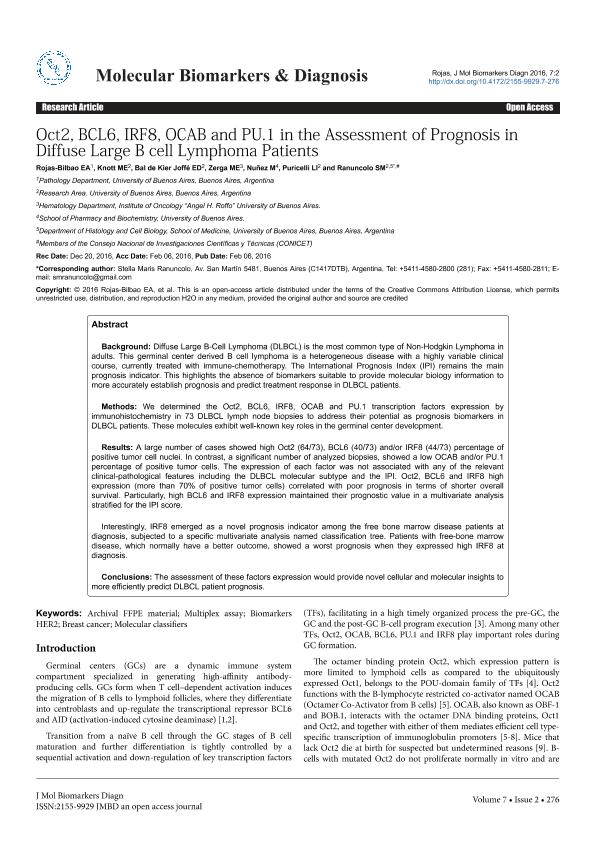Mostrar el registro sencillo del ítem
dc.contributor.author
Rojas Bilbao, Érica

dc.contributor.author
Knott, María Elena

dc.contributor.author
Bal, Elisa Dora

dc.contributor.author
Zerga, M. E.
dc.contributor.author
Nuñez, M.
dc.contributor.author
Puricelli, Lydia Ines

dc.contributor.author
Ranuncolo, Stella Maris

dc.date.available
2018-03-20T19:01:14Z
dc.date.issued
2016-02
dc.identifier.citation
Rojas Bilbao, Érica; Knott, María Elena; Bal, Elisa Dora; Zerga, M. E.; Nuñez, M.; et al.; Oct2, BCL6, IRF8, OCAB and PU.1 in the Assessment of Prognosis in Diffuse Large B cell Lymphoma Patients; OMICS International; Journal of Molecular Biomarkers and Diagnosis; 7; 276; 2-2016; 1-9
dc.identifier.issn
2155-9929
dc.identifier.uri
http://hdl.handle.net/11336/39405
dc.description.abstract
Background: Diffuse Large B-Cell Lymphoma (DLBCL) is the most common type of Non-Hodgkin Lymphoma inadults. This germinal center derived B cell lymphoma is a heterogeneous disease with a highly variable clinicalcourse, currently treated with immune-chemotherapy. The International Prognosis Index (IPI) remains the mainprognosis indicator. This highlights the absence of biomarkers suitable to provide molecular biology information tomore accurately establish prognosis and predict treatment response in DLBCL patients.Methods: We determined the Oct2, BCL6, IRF8, OCAB and PU.1 transcription factors expression byimmunohistochemistry in 73 DLBCL lymph node biopsies to address their potential as prognosis biomarkers inDLBCL patients. These molecules exhibit well-known key roles in the germinal center development.Results: A large number of cases showed high Oct2 (64/73), BCL6 (40/73) and/or IRF8 (44/73) percentage ofpositive tumor cell nuclei. In contrast, a significant number of analyzed biopsies, showed a low OCAB and/or PU.1percentage of positive tumor cells. The expression of each factor was not associated with any of the relevantclinical-pathological features including the DLBCL molecular subtype and the IPI. Oct2, BCL6 and IRF8 highexpression (more than 70% of positive tumor cells) correlated with poor prognosis in terms of shorter overallsurvival. Particularly, high BCL6 and IRF8 expression maintained their prognostic value in a multivariate analysisstratified for the IPI score.Interestingly, IRF8 emerged as a novel prognosis indicator among the free bone marrow disease patients atdiagnosis, subjected to a specific multivariate analysis named classification tree. Patients with free-bone marrowdisease, which normally have a better outcome, showed a worse prognosis when they expressed high IRF8 atdiagnosis.Conclusions: The assessment of these factors expression would provide novel cellular and molecular insights tomore efficiently predict DLBCL patient prognosis.
dc.format
application/pdf
dc.language.iso
eng
dc.publisher
OMICS International
dc.rights
info:eu-repo/semantics/openAccess
dc.rights.uri
https://creativecommons.org/licenses/by/2.5/ar/
dc.subject
Dlbcl
dc.subject
Prognosis_Biomarker
dc.subject
Germinal_Center
dc.subject
Oct2
dc.subject
Bcl6
dc.subject
Irf8
dc.subject
Ocab
dc.subject
Pu.1
dc.subject.classification
Medicina Critica y de Emergencia

dc.subject.classification
Medicina Clínica

dc.subject.classification
CIENCIAS MÉDICAS Y DE LA SALUD

dc.title
Oct2, BCL6, IRF8, OCAB and PU.1 in the Assessment of Prognosis in Diffuse Large B cell Lymphoma Patients
dc.type
info:eu-repo/semantics/article
dc.type
info:ar-repo/semantics/artículo
dc.type
info:eu-repo/semantics/publishedVersion
dc.date.updated
2018-03-20T14:36:16Z
dc.journal.volume
7
dc.journal.number
276
dc.journal.pagination
1-9
dc.journal.pais
Estados Unidos

dc.journal.ciudad
Oak Park
dc.description.fil
Fil: Rojas Bilbao, Érica. Universidad de Buenos Aires. Facultad de Medicina. Departamento de Patología; Argentina
dc.description.fil
Fil: Knott, María Elena. Universidad de Buenos Aires; Argentina. Consejo Nacional de Investigaciones Científicas y Técnicas; Argentina
dc.description.fil
Fil: Bal, Elisa Dora. Universidad de Buenos Aires; Argentina. Consejo Nacional de Investigaciones Científicas y Técnicas; Argentina
dc.description.fil
Fil: Zerga, M. E.. Universidad de Buenos Aires. Facultad de Medicina. Instituto de Oncología ; Argentina
dc.description.fil
Fil: Nuñez, M.. Universidad de Buenos Aires. Facultad de Farmacia y Bioquímica; Argentina
dc.description.fil
Fil: Puricelli, Lydia Ines. Universidad de Buenos Aires; Argentina. Consejo Nacional de Investigaciones Científicas y Técnicas; Argentina
dc.description.fil
Fil: Ranuncolo, Stella Maris. Consejo Nacional de Investigaciones Científicas y Técnicas; Argentina. Universidad de Buenos Aires. Facultad de Farmacia y Bioquímica. Departamento de Ciencias Biológicas. Cátedra de Histología y Biología Celular; Argentina
dc.journal.title
Journal of Molecular Biomarkers and Diagnosis
dc.relation.alternativeid
info:eu-repo/semantics/altIdentifier/url/https://www.omicsonline.org/open-access/oct2-bcl6-irf8-ocab-and-pu1-in-the-assessment-of-prognosis-indiffuse-large-b-cell-lymphoma-patients-2155-9929-1000276.php?aid=69932
dc.relation.alternativeid
info:eu-repo/semantics/altIdentifier/doi/http://dx.doi.org/10.4172/2155-9929.1000276
Archivos asociados
